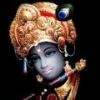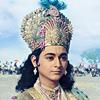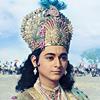Why Radha's name not mentioned?..read it..
The Padma Purana mentions eighteen thousand gopis among whom 108 are most important. Among those 108, eight are considered more important. Among the eight, two have a special position, Candravali and Radharani. Between the two, Padma Purana tells us Sri Radha is the foremost. According to Bhaktivinoda, Candravali herself admits this truth as she gazes upon Sri Radha's footprints along side of Krishna's.
Candravali admits that Radha loved Krishna more than anyone else (ayanaradhitam) including herself, for it was Radha he left the rasa lila for, to be alone with her. This is the 'tattva', the 'siddhanta' of the Bhagavata. It appears that in his vision of Candravali gopi's glorification of Radha, Bhaktivinoda Thakura has commented from this angle, whereas others have done so in consideration of 'bhava', the feeling of the text.
However, the question remains as to why the Bhagavata has mentioned Radha only once, and in doing so, why has it mentioned her covertly. Gaudiya Vaishnavas reason that indirect is more tasteful than direct, heightening thereby the effect. The Bhagavata covers our direct view of Sri Radha requiring us to look deeply within the text in devotion to see her.
Keeping the highest and most esoteric truth hidden from the unqualified (followers of jnana-marg, karma-marg, and vaidhi-bhakti marg) who were assembled at Sukadeva's speaking of the Bhagavata is offered as another reason for keeping Sri Radha veiled in secrecy. A third reason offered is that Sri Radha, as per the Brahma vaivarta Purana, was the 'ista devata' of Sukadeva Goswami. ...😊😊
If he were to utter her name, he would have lost external consciousness (avista citta) and thus been unable to address the urgent need of Pariksit Maharaja, who had but seven days to live and learn from Sukadeva. 😊😊
Jiva Goswami explains that Sukadeva himself reasoned that if he were to blurt out Radha's name at the climax of the Bhagavata, the full expression of 'rasananda' would not be served. Because the Bhagavata is first and foremost a book of rasa (muhur aho rasika bhuvi bhavuka), Sukadeva thus refrained from speaking it directly. However, he also reasoned that if he did not reveal her glory, he would be guilty of not distributing one's acquired knowledge and have to take birth as a 'brahma raksasa'. ...
In order to resolve this dilemma, Sukadeva revealed her name indirectly through Candravali gopi. Other reasons are suggested as well, while at the same time acaryas such as Visvanatha Cakravarti and others are just as prepared to demonstrate how innumerable verses of the Bhagavata are in actuality glorifying Sri Radha.
Sri Jiva Goswami, for example, offers an esoteric understanding of the first verse of the Bhagavata in his 'Krishna-sandarbha' through which he shows that the Bhagavata from the very beginning tells us that its pages are all about the love of Sri Radha for Govinda and its overpowering effect upon him.
Sri Jiva's rendering of the first verse of the Bhagavat is too beautiful and profound not to mention in brief. It serves as a deep insight into the mind of Vyasa and his 'samadhi bhasya', the Bhagavata. janmady asya yato 'nvayad itaratas carthesv abhijnah sva-rat
tene brahma hrda ya aadi-kavaye muhyanti yat surayah
tejo-vari-mrdam yatha vinimayo yatra tri-sargo 'mrsa
dhamna svena sada nirasta-kuhakam satyam param dhimahi
(BhP 1.1.1)
'Janmady asya yatah'. 'Janma' means manifestation, 'adyasya' means 'adi' or original, 'yatah' means from whom. Who has the original rasa (adi rasa/madhurya) manifested from? It indirectly manifests from Radha, who is 'itaratah', distinct from all others in her love for Krishna. It also directly manifests from Krishna (anvayat). Radha is indirectly the Absolute truth, and Krishna is directly so.
'Artesu' means various pastimes and 'abhijnah' means expert. They are expert in the performance of pastimes. Vyasa, the 'adi kavi', says the 'sabda brahma' entered my heart (hrda) and I understood through prema bhakti these pastimes (tene brahma hrda ya adi kavaye).
When Vyasa sat in meditation under the order of Narada, in a trance of prema bhakti (bhakti yogena manasi samyak pranahite 'male) this is what he realized, and it is about this, the pastimes of Radha-Krishna, that he wrote in his book, the Bhagavata.
Vyasa says that these two, Radha-Krishna, and Sri Radha in particular, are so wonderful. Who can understand them? Even Krishna is bewildered by Radharani. What then can Ananta sesa and others know about her (muhyanti yat surayah)?
Land (mrt) turns into water and flows, while water (vari) takes on the character of land and becomes stunned upon hearing the flute of Sri Krishna, which he plays only to attract Sri Radha, whose effulgence (tejah) dims the light of the stars and moon, 'tejo-vari-mrdam yatha vinimayo'.
Among the gopis, there are three kinds: those who favor Radha (headed by Lalita), those who serve in the opposition's side (headed by Candravali), and those who sometimes take the side of Radha and sometimes the side of Krishna (headed by Visaka).
They are all wonderful, yet all three groups (yatra tri-sargo) are insignificant (mrsa) in her presence, 'yatra tri-sargo mrsa'. All have their purpose only in relation to her. Radha's presence and influence (dhamna) defeats (nirasta) all interference (kuhakam) created by the opposition party, such as that of Jatila and Kutila, and the leader of the gopi opposition, Sri Candravali, 'dhamna svena sada nirasta-kuhakam'.
Thus their pastimes go on eternally (satyam). Therefore, I meditate in divine service (dhimahi) upon these two, Radha-Krishna (param), who are actually one in 'mahabhava', and one as potent and potency. In this verse Vyasa has described Radha and Krishna in the singular purposefully, and he has used the neuter gender because they are beyond the conceptions of male and female.
Edited by set_raj - 15 years ago




















comment:
p_commentcount